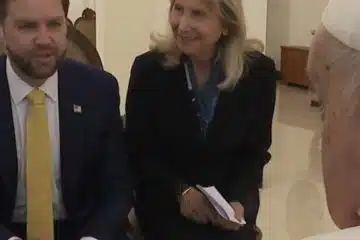Restorative justice seen as a critical piece of criminal justice reform

IMAGE: CNS photo/Jim Lo Scalzo, EPA
By Mark Pattison
WASHINGTON (CNS) — Restorative justice should be advocated as a key element in criminal justice reform, according to participants at an April 25 conference in Washington sponsored by the Catholic Mobilizing Network, which champions restorative justice as well as an end to the death penalty.
Just looking at the numbers, recidivism rates for adults are between 65 and 70 percent, according to Tim Wolfe, a sociology and criminal justice professor at Mount St. Mary’s University in Emmitsburg, Maryland.
“Depending on the nature of the restorative justice program, this can be cut in half, and can be even lower,” Wolfe said.
He quoted Jesuit Father Greg Boyle, who runs Homeboy Industries in Los Angeles for former gang members. Father Boyle had said, “A job may keep a kid from going back to prison, but a heal — he’ll never go back to prison again.” Wolfe said the priest was alluding to the pain many in prison or facing jail time have felt since childhood due to abuse and a lack of love. They committed crimes to try and erase that pain or to feel a sense of belonging.
“This is smart money,” Wolfe said during the conference, held at The Catholic University of America, Washington, one of the conference’s sponsors. “These are effective programs.”
Vicki Schieber, whose daughter was murdered by a serial rapist 20 years ago, said that her initial instinct upon hearing of her daughter’s slaying, despite a family steeped in the Catholic faith, was, “I wanna kill him.” Eventually, she and her husband determined that capital punishment for the criminal was “not what she would have wanted,” and sought to spare his life once the man was charged.
While the Schiebers were not permitted to meet their daughter’s murderer, they received a letter eight years after the crime in which he wrote, “I am so sorry that I did this to your family.” The Schiebers also corresponded with his mother, who wrote about ignoring her children’s pleas for them to leave her abusive husband: “Daddy’s being mean.” The woman, who died last year, said she should have listened to her children. “I am,” she wrote the Schiebers, “the one who murdered your daughter.”
“The church’s teaching on restorative justice is the best-kept secret of the best-kept secret,” which many identify as Catholic social teaching, said Msgr. Stuart Swetland, president of Donnelly College in Kansas City, Missouri, and a Catholic television and radio program host.
He lamented that the 1994 Get Tough on Crime Act banned the use of federal Pell grants to inmates to advance their education. Donnelly College established its own education-in-prison curriculum in which 420 inmates have taken courses, and 23 have earned degrees. Only four prisoner-students have returned to jail after having committed new crimes after their release.
“It’s a drop in the bucket. It’s one program in one place. But it works,” Msgr. Swetland said.
Kathryn Getek Soltis, an assistant professor of Christian ethics at Villanova University in Philadelphia and director of the school’s Center for Peace and Justice Education, voiced her hope that one day justice itself will be defined as restorative justice.
Soltis said society should own up to its “complicity in allowing people who have committed offenses to be people we are allowed to hate.”
Not providing education, work or living wages “are crimes, too,” Soltis said, “but we just don’t have any words for it.” Instead, “we cause the system to demonize people that we don’t want to consider part of ‘us’ … and we’ve created an economic system to keep this going.”
Jesuit Father George Williams, a Catholic chaplain at San Quentin since 2011, said: “Ninety-five percent of the people I work with in prison are addicts today or in there because of drugs.”
He agreed with Soltis’ point about the economics of incarceration. “There are very few, less than 5 percent,” who can’t ever be let out of prison, he said. Moreover, Father Williams added, “prison doesn’t have to be a hellish experience,” although the environment behind bars “depends on what level of cruelty we’re willing to tolerate.”
Congressional efforts on criminal justice reform, say members of both parties, “depend on a bipartisan consensus,” even if one can’t be achieved at the moment, said Michael O’Rourke, a policy adviser for the U.S. bishops’ Department of Justice, Peace and Human Development.
Sentencing reform is one key aspect of bills awaiting action, O’Rourke said, although restorative justice doesn’t seem to be included in them.
More action is in the states, he added, as the majority of people in prisons are there for state and not federal offenses. The cost of housing prisoners and the increasing costs of tending to an aging prisoner population are causing lawmakers to tweak state policy.
– – –
Follow Pattison on Twitter:@MeMarkPattison
– – –
Copyright © 2018 Catholic News Service/U.S. Conference of Catholic Bishops. www.catholicnews.com. All rights reserved. Republishing or redistributing of CNS content, including by framing or similar means without prior permission, is prohibited. You may link to stories on our public site. This copy is for your personal, non-commercial use only. To request permission for republishing or redistributing of CNS content, please contact permissions at [email protected].













